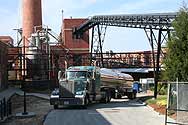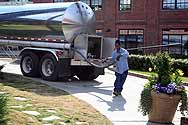 |
Drought Prompts River Recycling
Reclaimed Water Revives the Old Bull River
|

A truck bringing the first installment of recycled water arrives at American Tobacco on Wed, April 2nd. |
Moving 450,000 gallons of recycled water is not easy, but in a drought, necessity is the mother of invention. As part of a 1-month-old reclaimed water program, the City of Durham is giving the recycled wastewater to American Tobacco Campus to revive its man-made Old Bull River, which was shut down last year to conserve water.
Starting today, the transfer of water will take over a week and require 75 truckloads at 6000 gallons each to fill up the 1200 foot river running through the center of campus. The water is free from the city, but trucking the watery load will cost American Tobacco $20,000.
 |
 |
| The Bull River gets a splash from 6,000 gallons of recycled water. |
For American Tobacco General Manager Paul Pope, the effort is worth it. “Being good stewards of the environment ultimately benefits the whole community, and that’s good business. We’re fortunate the city now gives us a free way to conserve our water usage.”
While Durham’s program launched just last month, reclaimed water from wastewater treatment plants is widely used around the Triangle for irrigation, landscaping, pressure washing, and water fountains. The Town of Cary pumps reclaimed water back to residences for watering gardens and exterior cleaning. Reclaimed water is not potable, or drinkable, because it is not treated to the same standard as potable drinking water.

The Bull River runs again. |
“This is not gray water,” according to North Durham Water Reclamation Facility Superintendent, John Dodson, referring to water that leaves houses from sinks and toilets. “This is clear, clean water that has gone through four stages of biological treatment and is perfectly safe for non-potable uses.” Reclaimed water that is not recycled into the community is pumped into Ellerbe Creek, which then flows into Falls Lake.
Using reclaimed water for non-potable uses, such as in the man-made river and waterfall on the American Tobacco Campus can add significantly to the City’s drinking water supply. According to Dodson, roughly 50% of the water demand in the summer is for non-potable purposes. With 20 million gallons of water coming through both of Durham’s wastewater treatment plants everyday “there’s plenty of reclaimed water available and plenty of opportunities to use it.”
Because the use of reclaimed water is restricted, users must undergo special training, which the City of Durham provides. For information on Durham’s Reclaimed Water Program and training, contact John Dodson, John.Dodson@durhamnc.gov, 919-560-4384.
American Tobacco is working on other ways to reduce its carbon footprint by building a cistern system in the plaza between Diamond View II (nearing completion) and the future Diamond View III (adjacent to the Durham Bull’s Athletic Park) to capture rainwater runoff from both rooftops. The cistern water collection system will be capable of capturing approximately 150,000 gallons of water at a time from Diamond View II’s 29,000 square foot roof. Given current rainfall averages, this could add up to 800,000 gallons of collected runoff water per year. This water could then be used to irrigate all the campus’ landscaping, and possibly even the Durham Bull’s baseball field.
“Our goal, ultimately, “said Pope, “is to be ‘off the grid’, meaning American Tobacco is off the city’s water system for non-potable water.”
Thanks to Cindy Sink for this capcom story & to ATC’s Valerie Ward for these capcom photos.